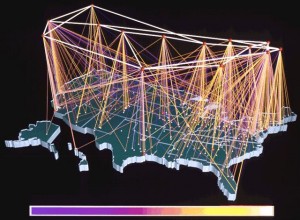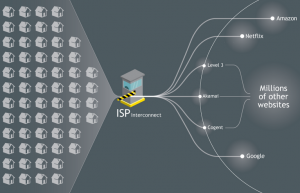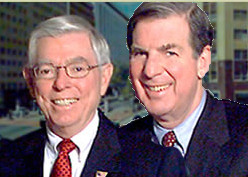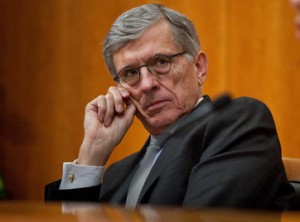
The benefits of open access to all the wonders on the World Wide Web is something most of us take for granted these days – enriching our lives and providing opportunities we wouldn’t have otherwise. For many, it is not just a luxury, it is a necessity. Developed with tax-payers money for the use and benefit of everyone, our ability to freely access all the content available on the network is due, in part, to the forward thinking of the builders who were guided by a principle known as “Net Neutrality”. Neutrality, as used here, simply means internet service providers (ISPs) should give all lawful traffic equal and unfettered access to the network without bias or prejudice. They must not block or discriminate based on content or source of that content and they must provide their services in an open and transparent manner to all.
Given that access to the internet is a vital and integral part of American life it is the Federal Communications Commission’s (FCC’s) responsibility to regulate the internet to ensure that this principle of “Net Neutrality” is enforced for the benefit of us all. The goal is to “preserve the Internet as an open platform enabling consumer choice, freedom of expression, end-user control, competition, and the freedom to innovate without permission.”
At least it was until a recent Federal Court ruling decided it wasn’t. In a lawsuit that Verizon brought against the FCC challenging the validity of “net neutrality” a DC Circuit Court of Appeals has ruled in Verizon’s favor – throwing the principles of non-discrimination and no blocking of content out the window. This controversial decision severely impacts the ability of the FCC to enforce a legitimate and very important public policy. It hinged largely on a technicality centered around the definition of “common carrier” and the fact that broadband providers are not classified as public utilities, and therefore, not subject to the same kind of regulations. FCC has decided not to appeal to the Supreme Court – leaving some legal scholars wondering why not?
Should the profits of a wealthy few trump the public good? THAT is the question.

In a nut shell, the court was asked to decide whether internet providers, like Verizon, be able to charge high bandwidth users like Netflix and YouTube higher premiums for higher speeds. While this may sound reasonable, it contradicts the FCC’s 2010 Open Network Rules (see page 14) which state clearly and with good reasons why internet providers may not block, edit or discriminate based solely on content.
To allow otherwise gives the ISP’s – who in many areas of the country have little or no competition – the undeserved and unwarranted power of being able to unilaterally threaten content providers with slower service unless they meet their demands to pay more. The ruling now makes it legal (though not ethical) for ISP’s to partially – or even completely – block legitimate content of other providers whose content competes with their own. — so much for “end-user control, competition, and freedom to innovate without permission”.

This opens the door (flood-gate?) to the concept of “pay to play” on the internet. Their plan is to have two lanes – a fast lane and a slow lane. This means the average website will now have to settle for a smaller slice of the limited available bandwidth (pipeline) along with much slower connections or compete with the big guys for bandwidth by paying a higher price. This becomes ever more important as consumer demand for video streaming grows. This gives those who can afford it an unfair advantage in marketing their products using what should be a public utility much like telephone, electric, and water companies – which are, by law, to be fairly and reasonably regulated as “common carriers” for the good of all (you might want to ask your Congressman about that). Remember, the ISP’s are already – very profitably – collecting hefty fees from all of us, the end users – though, apparently, it’s not enough to suit them. We pay them because they promise to connect us to any legally available content we choose – NOT to arbitrarily degrade the content of competitors so we’ll settle for their’s just because it’s a better connection. Also remember – it’s not like most of us have a lot of choice (if any) of how we connect.

Made close to $16 MILLION dollars last year. $14 MILLION the year before and $23 MILLION the year before that. For his extra hard work this year his bonus is due to increase from $9.2 MILLION to $11.1MILLION. (but hey, he earned it – right?)
In the past, access to video media platforms that could reach a mass audience was basically limited to the corporations. With the Internet, everyone has access to such platforms – at least they did. Allowing paid prioritization will shift power away from the small companies with limited capital, the startups on a shoestring, the lone but brilliant innovators, the legions of altruistic open-source programmers and content providers who believe in the promise of the internet to make a better world – the ones who are really behind the internet’s economic and technological growth – returning it to a few giant multi-national corporations like Verizon, AT&T, Comcast and Time-Warner-Cable; companies run by people whose sole purpose is to grow and maximize profits in any way they can in order to justify to their investors the tens of millions of dollars they collect in bonuses.
Maintaining a system of inequality and disparity of wealth that is surpassing even that of the “robber barons” of the late 19th century, these “last mile bottleneck” monopolies can now become the gate-keepers to online content and will be in a position to stifle or buy out any innovation that threatens their plans to control the new media economy.
For an enlightening inside look at Verizon’s corporate culture checkout the Proxy Statement for their 2014 Annual Meeting for Shareholders. Page 21 should be of particular interest as it deals with a shareholder’s proposal (Item 5) for management to provide more clarity regarding its position on “Net Neutrality” – Board of Directors recommendation? Vote No. The same goes for Item 6, a proposal to make a report on the amount of money that is being spent on Government and public lobbying efforts ($31 million in 2012) – Vote No.
Starting on page 30 you may find interesting the discussion of how fair and reasonable they are in the “performance based” compensation of their executives. For example on page 41 you will see that for 2014 Mr. McAdam’s “incentive opportunity” was increased from 625% of his base pay to 750%. His base salary is $1,480,769 dollars. This increases his incentive from $9,254,806.25 dollars to $11,105,769.50 for a raise of $1,850,961.25 in 2014. (That ought to get him moving, right?) This is on top of his stock options and the $780,874 dollars in “other perquisites” of course; like, security for his home, “financial planning services” (definitely need that), life insurance, personal use of the company jet, travel expenses for the Mrs. etc. – but I digress.
Think about how well cable TV has worked in providing us choices in programming – the tiered packaging, the exorbitant add-on fees, the poor service and quality of content. This is what could happen to the Internet. It is no exaggeration to say that this could have a huge impact on how the internet will be used in the future – potentially affecting the daily lives of millions of Americans in negative ways. Schools, libraries, e-government services, licensed databases, job-training videos, medical and scientific research, and many other essential services – all rely on open, affordable access to the internet.
The internet is a resource that was developed with taxpayers money. Unbiased access to the internet should not be a privilege open to a few but a right enjoyed by all. An open internet is key to a vibrant cultural, economic, and civic life, and the FCC has an obligation to protect it. This means the FCC needs to reclassify broadband internet providers as telecommunications companies subject to the same “common carrier” rules as the other public utilities. These rules need to be strong enough to protect an open internet from the greed and power of the giant corporations.
But we needn’t despair just yet, there’s still hope. Many organizations are now mobilizing to support net neutrality. They come from widely varied political backgrounds including groups such as the American Library Association, Public Knowledge, MoveOn.org, Free Press, Consumer Federation of America, AARP, the Media Access Project TechNet, and Tim Berners-Lee (the inventor of the World Wide Web). And, of course, Netflix has come out strongly in favor.

The FCC simply has to re-establish its legal authority and begin to vigorously enforce the fair and reasonable Open Internet Rules already in place (just read the first page summary and decide for yourself). Fortunately, the FCC claims that it has not abandoned the principle and is talking about rewriting the rules to satisfy the Court.
We’re in this mess because the FCC in 2002, under Michael Powell, reclassified broadband cable companies as information service providers, knowing full well that information services (or content providers) aren’t subject to the same regulations as telecommunications services (phone and digital communications providers).
This is the crux of the problem – how to regulate providers who are engaged in both. This technicality of determining “common carrier” status was first defined in the Communications Act of 1934 and later was ammended in the Telecommunications Act of 1996. A discrepency between the two versions is the reason the Court gave for ruling in Verizon’s favor. For an illuminating (or NOT) discussion of the Courts thinking See page 45. Besides reclassifying broadband as a telecommunications service, the FCC needs to augment the rules with common sense ideas like these.
It’s hard to not be cynical but if enough people, informed with the facts, stand up and make their views known change can happen. It just isn’t right that the greed of a wealthy few can ride rough-shod over justice and common decency in this country. We should not have to accept a fast lane for the haves and a slow lane for the have-nots The promise of the Internet is too important to sell to the highest bidder – it belongs to us all.
“The success of contemporary citizen activism depends upon the ability to ferret out key information, often against the efforts of powerful interest, and the skills to put such information to effective use.” Harry C. Boyte. CommonWealth: A Return to Citizen Politics.
You can help make a difference by contacting your Congressman and adding your name to these petitons.The first is a petition to President Obama, and the second a petition to the FCC to restore “Net Neutrality”. Do it now, and pass this on; at least you’ll be able to tell your kids you tried to do something.